Why Does My Scalp Smell? Dermatologists Reveal What Women Over 50 Need to Know
Plus dermatologists' simple solutions to remedy the root of the problem
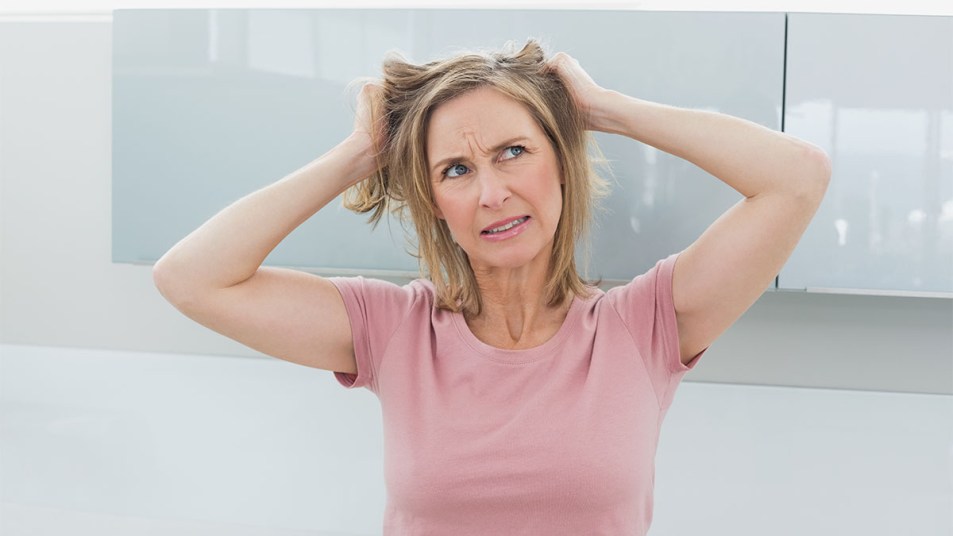
In a sea of hair care stories, scalp care is trending. In the past year, hashtags (or ways people search for topics on social media) for #ScalpTreatment and #ScalpCare have more than a BILLION views. What is the root cause of this resurgence in scalp interest? Many women are suffering from a smelly scalp — and they don’t know why. So if you’re one of those asking, “Why does my scalp smell?”, we have the answers you need, plus the simple solutions.
What does my scalp smell?
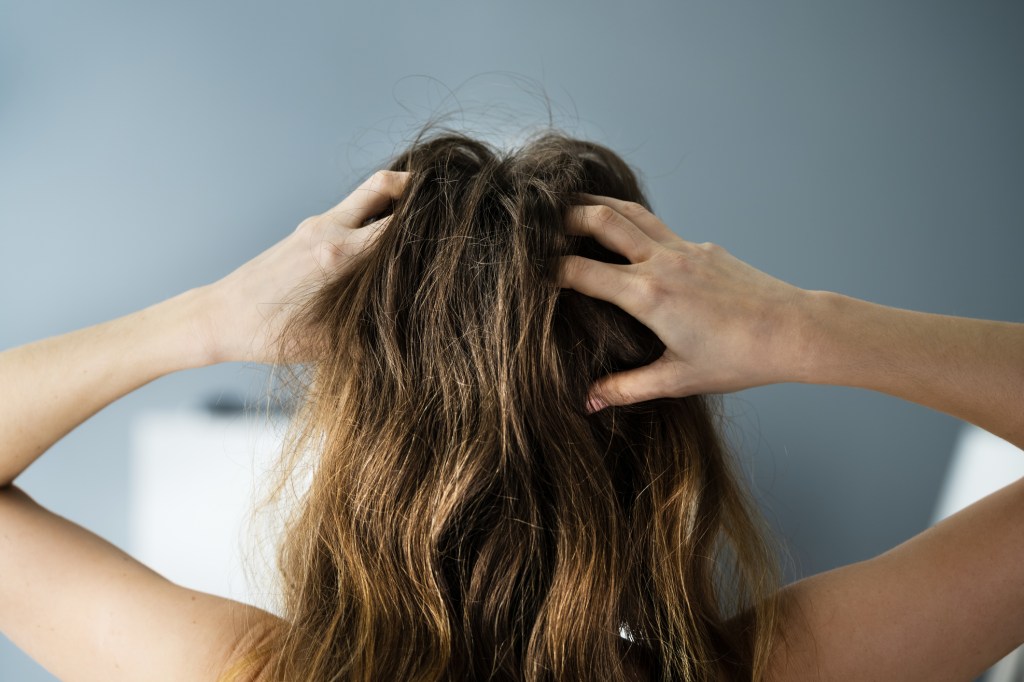
“When considering any unpleasant odor, it is always a result of bacteria combining with moisture, often sweat, leading to a smelly buildup. The accumulation and thickening of skin in a particular area contributes to this condition,” says Richard Bottiglione, MD, board-certified dermatologist in Phoenix. What’s more, “scalp odor is influenced by a variety of factors, including genetics, diet, lifestyle, medications, hygiene and the activities of microorganisms that reside in the skin,” explains Alan J. Bauman, MD, ABHRS, IAHRS, FISHRS, founder, CEO & medical director of Bauman Medical Hair Transplant & Hair Loss Treatment Center in Boca Raton, FL.
But if your scalp still smells even after you shower and wash your hair, you could have a more pressing problem. Read on to find out what could be causing your smelly scalp and how to combat it.
Dr. Bauman breaks down the possible answers to, Why does my scalp smell?
1. Excess sweat and sebum
“The scalp has sweat and sebaceous glands that produce sweat and oil. When these natural secretions mix with bacteria or other microorganisms on the scalp, and they begin to break them down, it can lead to an unpleasant odor,” says Dr. Bauman.
“The scalp is one of the oiliest parts of the body, having a denser amount of oil glands than other areas. People often mistake dryness for the scalp’s flakiness, which we call dandruff. This dandruff is scalp inflammation typically caused by yeast, known as seborrheic dermatitis,” explains Rachel Nazarian, MD, FAAD, a board-certified dermatologist in New York.
“Seborrheic dermatitis involves the overgrowth of Malassezia species of fungus on the scalp leading to symptoms of redness, itchiness, flakiness (dandruff) and often a foul odor,” says Dr. Bauman. In fact, according to the International Journal of Trichology, dandruff affects more than 50% of the adult population worldwide. Women over 50 can see an even larger occurrence of the condition because of the lack of estrogen that occurs during menopause. Estrogen is the hormone responsible for sebum production in the scalp.
2. Fungus
Bacteria and fungi are microorganisms that naturally inhabit the scalp, collectively called the scalp microbiome. “When the scalp microbiome is disrupted, or infections occur, you may get an overgrowth of certain bacteria or fungi, leading to a change in scalp odor,” Dr. Bauman says.
According to the Mayo Clinic, the yeast-like fungus that feeds on the oils of our scalps and can contribute to dandruff can be a root cause of scalp odor, as well as other skin diseases you may already be diagnosed with that inhabit the scalp and throw off its microbiome balance, such as eczema or psoriasis.
3. Dead skin
Since the scalp is the fastest aging skin on our body, aging 12 times faster than the skin on our body and six times faster than facial skin, this affects the overall condition of the hair, contributing to and often exacerbating scalp concerns. As we get older, so does our scalp skin, which loses its elasticity. Just like you need to rid yourself of dead skin cells elsewhere, the same goes for the scalp.
While the scalp sheds dead skin cells regularly, it might not be enough, says Dr. Bauman. “If these cells accumulate on the scalp’s surface, they can mix with sweat and oil, forming an environment that favors certain fungal growth, contributing to an odor.”
4. Hair products
The use of hair styling products, such as gels, hairsprays and waxes, can sometimes leave residues on the scalp that, when mixed with sweat and oils, can create a scalp stench, explains Dr. Bauman.
5. Underlying health conditions
Sudden changes in the scalp or body odor can indicate underlying medical conditions such as diabetes, cancer, liver or kidney disease, thyroid disorders, hormone imbalance (such as during menopause), infections and more. It’s best to check with your doctor if you suspect any of these could be the culprit, advises Dr. Bauman.
6. Environmental triggers
Pollutants and dust in the air can cling to your hair and scalp, causing it to stink.
How do I fix a smelly scalp?
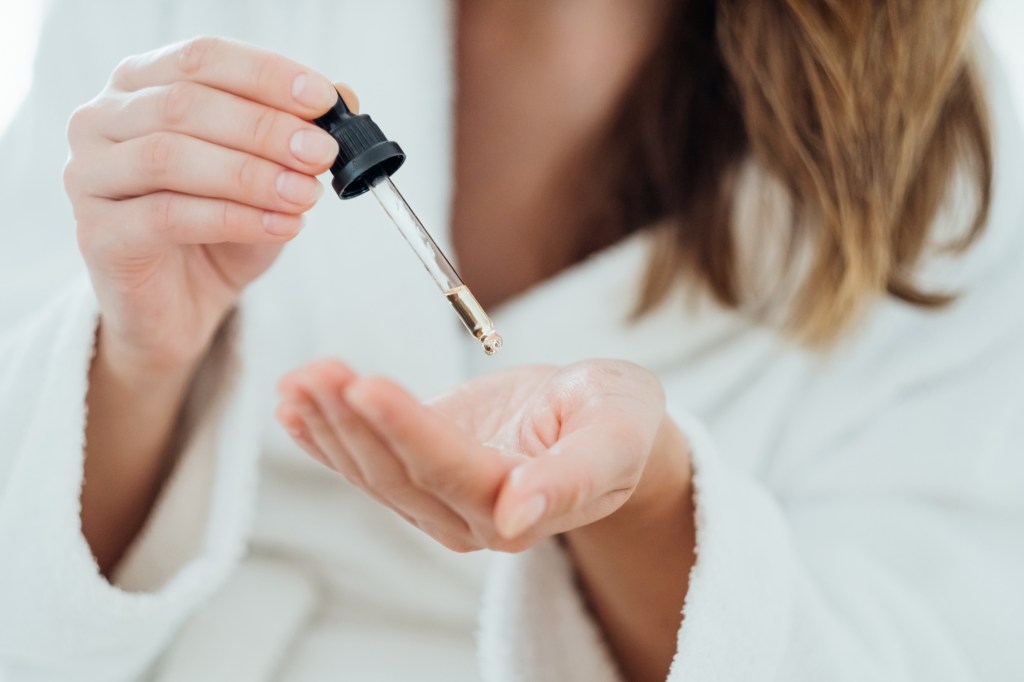
You can do a few things to stop the scalp smell in its tracks, starting with your haircare regimen.
1. Know how and when to wash your scalp
You need to wash your scalp — but experts say there’s a delicate balance between washing it enough and too much. “Our scalp skin needs cleansing just like the rest of our skin as oils, sebum and bacteria can accumulate on the scalp, but the balance of washing too infrequently vs. too frequently is a factor,” says multi-specialist physician Azza Halim, MD.
A good rule of thumb is every two days. “Wash your hair and scalp with a mild, PH-balanced shampoo, like Vitabrid C12 Scalp+ Shampoo (Buy from Saks Fifth Avenue, $32), or if you suspect a fungal infection, a medicated shampoo, like Neoketramin (Buy from Amazon, $24.99), can help,” says Dr. Bauman. When washing, you should massage gently in circular motions, careful not to dig fingers or nails into the scalp as that can exacerbate the condition.
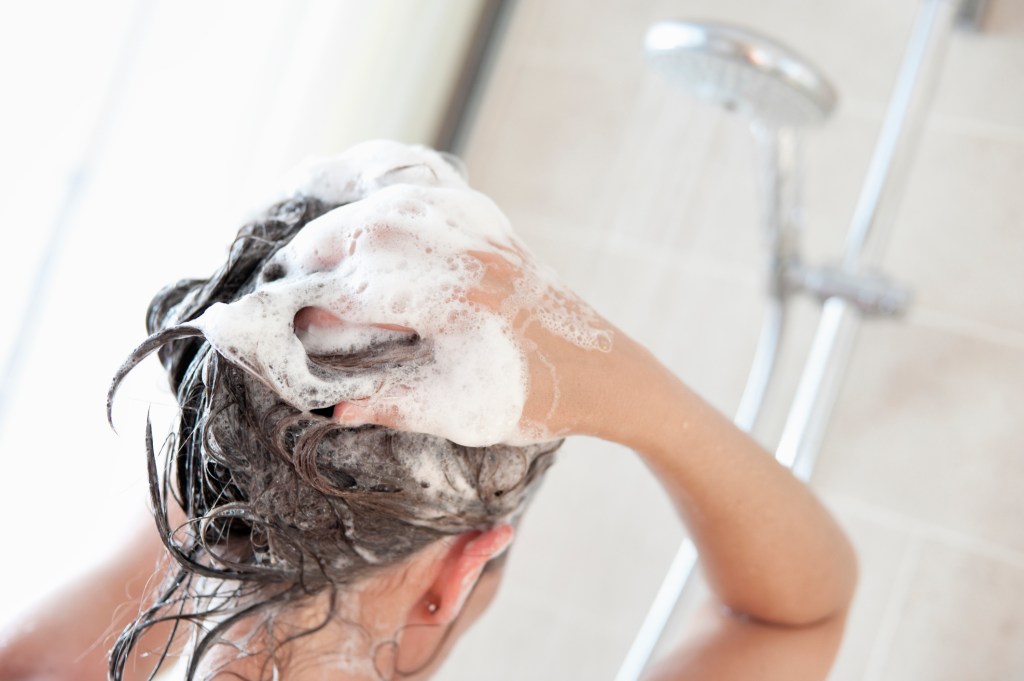
Dr. Halim says a clarifying shampoo containing apple cider vinegar or tea tree oil can also do the trick if product buildup is to blame for your scalp odor. You can also try an apple cider vinegar rinse made of 4 tablespoons of AC vinegar and 16 ounces of water. Just pour it over your head evenly, work it into your scalp with your fingertips, sit for a few minutes and rinse. You can do this 1-2 times per week.
2. Exfoliate your scalp
Dr. Bauman also advises exfoliating your scalp with a soft brush, like YloyiY silicone massager (Buy from Amazon, $3.99), or with a scrub like Straand Scalp Care scrub (Buy from Straand, $24), once or twice a week to get rid of those dead skin cells your scalp isn’t shedding naturally.
3. Enlist charcoal
Products containing charcoal or tar can also combat scalp stink, like this amika Reset Pink Charcoal Scalp Cleansing Oil (Buy from Amazon, $28.50), which delivers oxygen and hydration deep into the scalp.
4. Check your diet
As with anything else, your diet affects the health of your scalp. “Consuming a diet rich in fruits and vegetables and staying hydrated helps control body odor, which includes scalp odor,” says Dr. Bauman. You can also try an elimination diet, i.e., cut out certain foods and see if the scalp smell ceases or persists. Work those foods back into your diet if they don’t seem to be causing a problem.
When is it time to call a doctor about a smelly scalp?
While you can try some of the suggestions above, all of our experts agree that this problem can and should be evaluated by a professional. “Consulting a certified trichologist who specializes in hair and scalp health can provide a detailed scalp evaluation, personalized advice and possibly even in-office treatment options targeted to the cause of your scalp odor,” urges Dr. Bauman.
How to cover up a smelly scalp
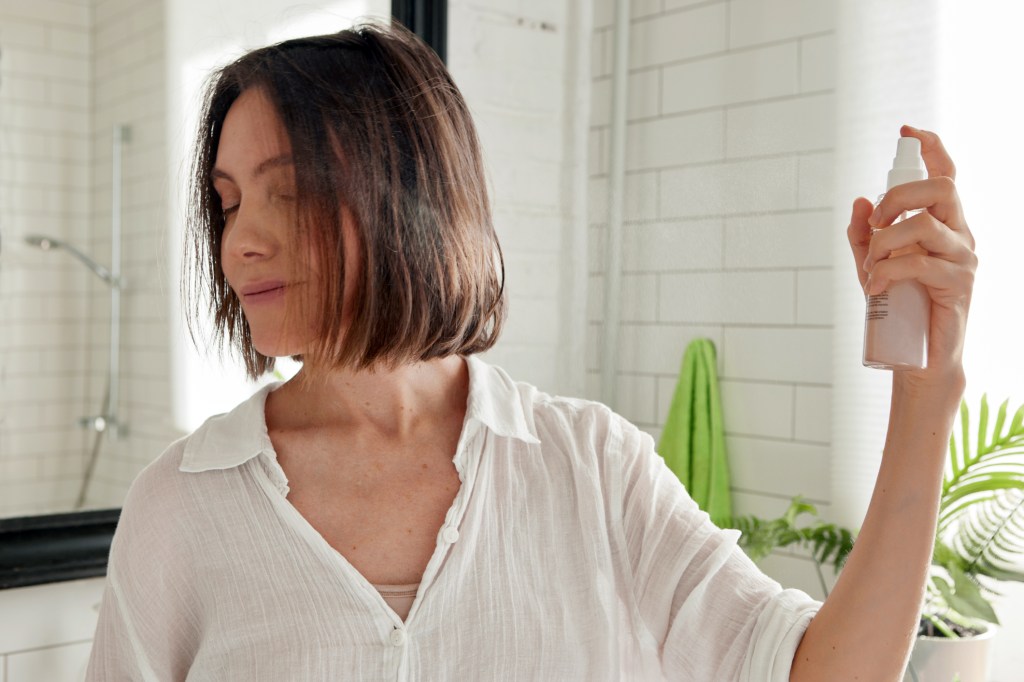
It’s no surprise scalp perfumes have emerged as a trend of late with all the recent interest in scalp care. And if you plan to cover up scalp odor with one, be sure that it’s specially made for scalp and hair as the Food and Drug Administration (FDA) warns that the common main ingredient in regular perfumes (ethyl alcohol) can have a drying effect on skin and hair. Three great options:
- Essential oils. You can DIY your own scalp perfume with essential oils, says Dr. Halim, to ensure you aren’t getting harsh, synthetic ingredients on your hair and scalp. Simply mix ½ cup of distilled water (or rose water) with 1 tbsp. of argan oil and 10-12 drops of your favorite essential oil, and spritz it onto your hair and scalp. Or you can pick up Morocconoil’s version (Buy from Sephora, $18), which blends woody and floral notes.
- Dove Care Between Washes Hair Perfume (Buy from Amazon, $17.99). It uses white tea and jasmine to nourish the scalp and fight the odors from dirt and sweat.
- Goldwell Kerasilk Color Beautifying Hair Perfume (Buy from Walmart, $24.25). We love products that do double-duty (saving us money and space in our bathroom cabinets in the process). This one not only revives dull color in color-treated, damaged and aging hair, but infuses fragrance into hair and scalp at the same time.
For more hair and scalp tips, click through these stories:
Aloe Vera Gel Can Help Heal Scalp to Reverse Thinning Hair + Makes Skin Gorgeous
If You Have Thinning Hair or a Flakey Scalp, This $10 Natural Oil Will Be Your Beauty Hero
Can Flaxseed Gel Reverse Thinning? Hair Restoration Doctor Weighs In













